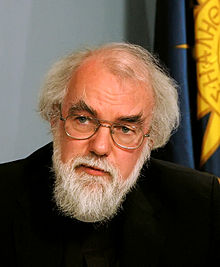The Lord Williams of Oystermouth | |
|---|---|
| Archbishop of Canterbury Primate of All England | |
 Williams in 2007 | |
| Church | Church of England |
| Province | Canterbury |
| Diocese | Canterbury |
| Elected | 2 December 2002 [1] |
| Installed | 27 February 2003 |
| Term ended | 31 December 2012 (retired) [2] |
| Predecessor | George Carey |
| Successor | Justin Welby |
| Other post(s) | Archbishop of Wales (2000–2002) Bishop of Monmouth (1992–2002) |
| Orders | |
| Ordination | 2 October 1977 (deacon) by Eric Wall 2 July 1978 (priest) by Peter Walker |
| Consecration | 1 May 1992 by Alwyn Rice Jones |
| Personal details | |
| Born | Rowan Douglas Williams 14 June 1950 |
| Denomination | Anglicanism |
| Parents |
|
| Spouse | |
| Profession | Bishop, theologian |
| Alma mater | |
| Motto |
|
| Signature | |
| Coat of arms | |
| Master of Magdalene College, Cambridge | |
| In office January 2013 – October 2020 | |
| Preceded by | Duncan Robinson |
| Succeeded by | Sir Christopher Greenwood |
| Member of the House of Lords (life peer) | |
| In office January 2013 – 31 August 2020 | |
| Academic background | |
| Education | Dynevor School, Swansea |
| Alma mater | |
| Thesis | The Theology of Vladimir Nikolaievich Lossky: An Exposition and Critique (1975) |
| Academic work | |
| Discipline | Theology |
| Sub-discipline | |
| School or tradition | Affirming Catholicism |
| Institutions | |
Rowan Douglas Williams, Baron Williams of Oystermouth (born 14 June 1950) is a Welsh Anglican bishop, theologian and poet, who served as the 104th Archbishop of Canterbury from 2002 to 2012. Previously the Bishop of Monmouth and Archbishop of Wales, Williams was the first Archbishop of Canterbury in modern times not to be appointed from within the Church of England.
Williams's primacy was marked by speculation that the Anglican Communion (in which the Archbishop of Canterbury is the leading figure) was on the verge of fragmentation over disagreements on contemporary issues such as homosexuality and the ordination of women. Williams worked to keep all sides in dialogue.[1] Notable events during his time as Archbishop of Canterbury include the rejection by a majority of dioceses of his proposed Anglican Covenant and, in the final general synod of his tenure, his unsuccessful attempt to secure a sufficient majority for a measure to allow the appointment of women as bishops in the Church of England.
Having spent much of his earlier career as an academic at the universities of Cambridge and Oxford successively, Williams speaks three languages and reads at least nine.[3] After standing down as archbishop, Williams took up the position of chancellor of the University of South Wales in 2014 and served as master of Magdalene College, Cambridge between 2013 and 2020. He also delivered the Gifford Lectures at the University of Edinburgh in 2013.
Williams retired as Archbishop of Canterbury on 31 December 2012, succeeded by Justin Welby.[2] On 26 December 2012, 10 Downing Street announced Williams's elevation to the peerage as a life peer,[4] so that he could continue to speak in the House of Lords. Following the creation of his title on 8 January and its gazetting on 11 January 2013,[5] he was introduced to the temporal benches of the House of Lords as Baron Williams of Oystermouth on 15 January 2013,[6] sitting as a crossbencher. Oystermouth is a district of Swansea. He retired from the House on 31 August 2020[7] and from Magdalene College that Autumn, returning to Abergavenny, in his former diocese (Monmouthshire).[8]
- ^ a b "Profile: Dr Rowan Williams". BBC News. 8 February 2008. Archived from the original on 12 February 2008. Retrieved 6 August 2024.
- ^ a b "Rowan Williams joins House of Lords with nod to Swansea". BBC News. 15 January 2013. Archived from the original on 16 January 2013. Retrieved 6 August 2024.
- ^ See Profile of Master Archived 27 January 2013 at the Wayback Machine at Magdalene College, Cambridge; BBC Russian.com interview with Williams: ``Я читаю на девяти или десяти языках, но говорю только на трех.`` ("I read nine or ten languages, but speak only three.")
- ^ "Peerage for the Lord Archbishop of Canterbury - GOV.UK". Number10.gov.uk. Retrieved 23 December 2017.
- ^ "No. 60389". The London Gazette. 11 January 2013. p. 477.
- ^ "Introduction: Lord Williams of Oystermouth". Parliamentary Debates (Hansard). UK: House of Lords. 15 January 2013. col. 585. Retrieved 18 January 2013. "Lords Hansard text for 15 Jan 201315 Jan 2013 (Pt 0001)". Archived from the original on 25 January 2017. Retrieved 18 January 2013.
{{cite web}}: CS1 maint: bot: original URL status unknown (link) - ^ "Lord Williams of Oystermouth". UK Parliament. Retrieved 1 September 2020.
- ^ "Farewell Rowan and Jane Williams". Magdalene College. October 2020. Retrieved 3 October 2020.